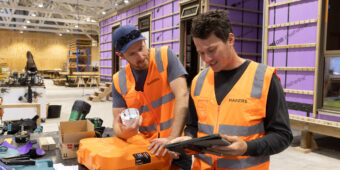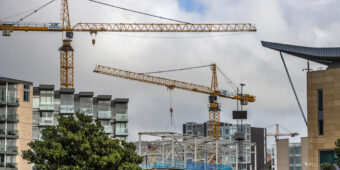Spotlight on Wellington
12 Sep 2017, Industry News

Building activity has been steadily ramping up in the capital over the past few years, with local builders comparing current activity to the previous boom in the early 2000s
Martin Goulden, owner of Miramar-based Martin Goulden Builders Ltd, has been building in the Wellington region for more than 20 years and says the market is as busy as he’s ever seen it.
“Most of our work is around central Wellington, but we do occasionally have jobs around Newlands and in the Hutt Valley,” says Martin. “I’ve noticed that people are making enquiries sooner than they normally would to book work and I know that some of them have found it bloody hard to get a call back from a builder for small jobs.”
Stats NZ consents data shows that, in the Wellington region*, 12,964 new residential dwelling consents were issued from 1998 to 2003, compared to 8,130 from 2011 to 2016. In the first five months of this year, 619 new residential dwelling consents have been issued.
However, Martin says that from, his perspective, the market is as busy as it has ever been.
“The pipeline of work we have now is similar to what we experienced during the previous peak period in the early 2000s. I’ve got two years in front me at the moment and I think everybody in the industry – from the sub-trades through to suppliers – is having to work really hard to meet the demand.”
“We’ve got up to an eight-week wait on aluminium windows at the moment; normally it’s half that. Compliance is also a challenge. As an example, we’re working on a two-week job stripping linings and re-jibbing. We require a couple of inspections in that time, but they need to be booked about a week in advance because of demand – getting the timing right is quite hard.”
Dan Albert, owner of Quality Construction, has been building around Wellington for more than 30 years. Now operating predominantly around Porirua, Dan also sees today’s market as comparable to the early 2000’s boom.
“We’re very busy. Satisfying clients’ expectations concerning wait times is difficult, especially given that today’s t
echnology means people are used to getting things instantly. As a result, communication is very important and you need to be really organised to ensure your subcontractors and suppliers are available when you need them.”
He says one of the biggest differences between now and then, though, is the way in which franchise home-building companies now dominate the market for new builds.
“There weren’t so many of these around 20 years ago, so smaller builders did a lot of that work. It’s a lot harder to get those jobs now. Another difference is that in-fill housing has become a lot more common because of the pressures on land supply and this is where we can be more competitive.”
Staff pressures
While neither Martin nor Dan have been in the market for new workers recently, both say they’ve heard anecdotally finding staff is difficult.
“I have a team of 15 staff and, of those, 12 have either done their apprenticeships or are training with us. I’m lucky that a lot of them have elected to stay on, because it means we’re insulated from some of those pressures,” says Martin. “I think it’s really important for building businesses to train people and I think one of the reasons we have a shortage in the industry is that not enough people are doing training.
“We’ve put the effort in and it’s definitely paid off for us. We also look at our rates annually and I put them up recently to facilitate a raise for our staff. I think traditionally wages have been low in the industry and they’re now starting to come up, which hopefully will attract more people.”
Dan, who has five staff, including two apprentices, says he’s heard from other builders that hiring quality carpenters is hard.
“I don’t think Wellington goes through the same highs and lows as other parts of the country, so the staff pressures aren’t the same here as in Auckland and other areas. But it’s still quite a challenge from what I’ve heard,” he says.
“I advertised around 18 months ago on TradeMe for a carpenter and only got a few applications, none of which met my requirements, and I believe it has become more difficult since then.”
Shared experience
To help raise the skill levels of Wellington builders, the local Registered Master Builders (RMB) branch has been hosting peer-to-peer training sessions.
So far, they’ve hosted three courses covering health and safety, estimation and rehabilitation. Branch president Peter Camp says each session has attracted up to 25 builders.
“The training is an opportunity to share experience in a low-key environment. The feedba
ck we’ve received on the sessions is great, particularly regarding the peer-to-peer aspect,” says Peter.
One more course on health and safety is scheduled for this year, and courses planned for 2018 including on-site management, business skills and covering building legislation such as the Construction Contracts Act.

*The total number of consents isn’t based on Wellington regional totals included in Stats NZ releases, but rather the combined total from the Kapiti Coast District, Porirua City, Upper Hutt City, Lower Hutt City and Wellington City councils to remove consents from outside the main Wellington area.
Register to earn LBP Points Sign in



